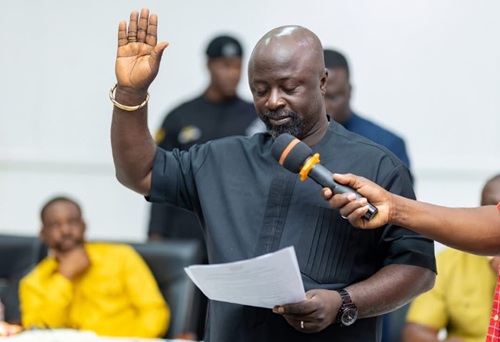By ABC News GH | April 15, 2025
The Chamber for Local Governance (ChaLoG) has issued a stern rebuke to the newly appointed Mayor of Kumasi, Richard Ofori Agyemang Boadi, over his recent threat to lash traders operating on pavements within the city’s central business district.
In an interview on Prime News on ABC News GH, the Executive Director of ChaLoG, Mr. Richard Fiadomor, described the mayor’s remarks as “reckless and very irresponsible,” warning that such behavior could jeopardize his tenure.
“For you to come and your first course of action is to threaten to beat people, that is not the language of leadership,” Mr. Fiadomor stated. “It is common knowledge that he hasn’t even met the relevant stakeholders. He is overexcited about becoming mayor and was clearly carried away by his irresponsible comment.”
The uproar follows Mayor Boadi’s controversial directive issued during a press briefing on Monday, April 14.
He gave traders two weeks—starting April 16—to vacate the pavements or face harsh sanctions, including public lashing. His rationale: the failure of traditional enforcement measures such as arrests and confiscation of goods to permanently dissuade hawkers from returning.
According to Mr. Boadi, the Kumasi Metropolitan Assembly (KMA) will begin a two-week decongestion campaign, describing his approach as a mix of “military-style enforcement and democratic principles.”
He said these tough measures are necessary to restore order and ease the growing congestion in the city.
But ChaLoG believes the mayor’s approach is misinformed and counterproductive.
“He was supposed to go into stakeholder engagement with the leadership of trader associations and relevant city authorities before coming out with such pronouncements,” Mr. Fiadomor emphasized.
“You need to study the system before you go out to make any public declaration. If he doesn’t take his time to understand how the local system works, he will not survive in that position. A mayor does not speak like that.”
Background: An Old Problem, A New Controversy
Kumasi, the capital of the Ashanti Region and Ghana’s second-largest city, has long grappled with street vending and congestion. Efforts to decongest the city date back decades, with successive administrations launching operations to clear unauthorized traders from roads and walkways—often with little long-term success.
The recent resurgence of hawkers on pavements in areas like Adum, Kejetia, and Asafo has reignited calls for strict enforcement. However, Mr. Boadi’s remarks mark a shift from typical administrative caution to openly punitive threats—drawing sharp criticism from civil society and local government observers.
Though Mr. Boadi insists that his tough approach is necessary to restore discipline and urban order, many believe he has crossed a line, especially by invoking corporal punishment as a deterrent.





















